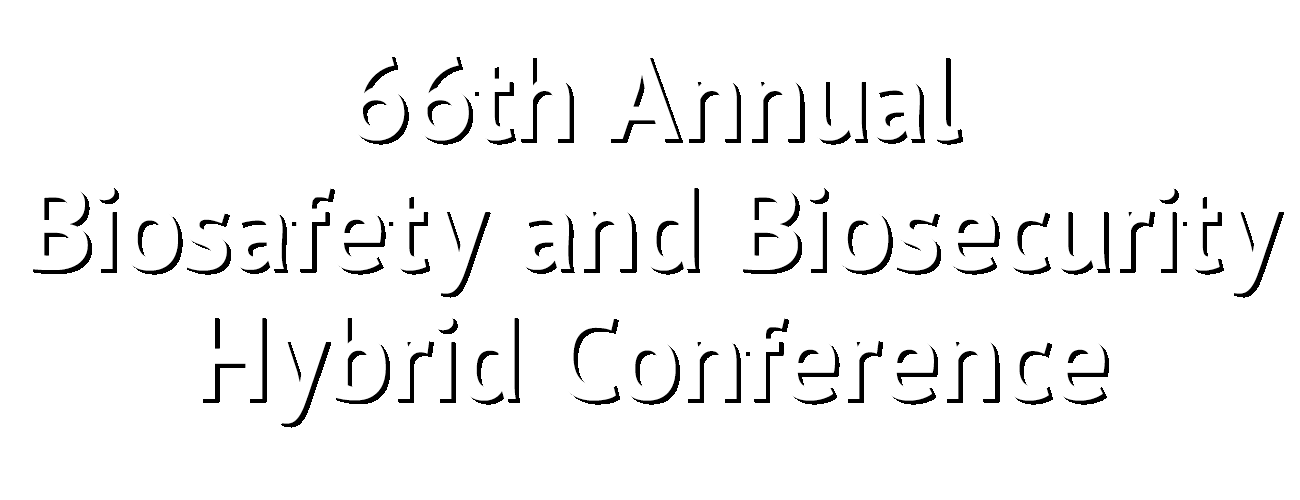Professional Development Courses
All times listed are in CENTRAL TIME ZONE .
Advanced Level Courses
For those with experience or looking for a challenging course.
October 13-15, 2023
CHI Health Center, Omaha, Nebraska
Saturday, October 14, 2023, 8:00 AM – 5:00 PM, Room 208
7. Animal Research for Biosafety Professionals – Advanced
This course builds on general principles presented in the introductory class (Animal Research for Biosafety Professionals—An Introduction) and focuses on complex animal and research-based scenarios that present unique and challenging safety concerns. Topics include viral vectors; patient-derived xenografts (PDX) and humanized animals; nanoparticles; cytotoxic drugs; arthropod containment within a vivarium; aquatic animal models; wildlife species; biosecurity challenges; facility design; animal imaging; high-containment; animal program disaster planning; and management of chemical and biological wastes (e.g., bedding and carcasses). Proven strategies for optimizing safety program outcomes through constructive partnerships between various disciplines, including safety professionals and key animal program representatives will be presented. The course will be highly interactive and focus on problem-based learning through scenarios and interactive exercises that illustrate “real world” examples in research facilities, diagnostic laboratories, and teaching programs that use animals. Participants will practice developing strategies to identify potential hazards, assess the magnitude and extent of induced risks, learn about case-specific variables that can influence management options, and implement effective and cost-efficient control measures that protect the safety of workers, animals, and the environment.
Objectives:
- Review hazard identification and risk assessment strategies as they pertain to a variety of animal models, including aquatics and wildlife, and complex animal facility environments
- Apply effective control strategies for unique animal hazards through proactive experimental design and facility management procedures
- Identify ways safety professionals can partner with animal program personnel to address new and emerging safety issues associated with animal-based research
Suggested Background: Basic knowledge of, and experience with, identifying and managing common hazards found in animal research (Animal Research for Biosafety Professionals – An Introduction)
Target Audience: Experienced Biosafety Professionals, All Safety Professionals, Laboratory Workers, Experienced IACUC and Safety Committee Members
PDC Level: Advanced
COURSE FACULTY
CONTACT HOURS
This course has been approved for 1.0 CM points toward RBP/CBSP recertification. ABSA International is approved as a provider of continuing education programs in the clinical laboratory sciences by the ASCLS P.A.C.E.® Program. This course is approved for 7.5 P.A.C.E.® contact hours.
Sunday, October 15, 2023, 8:00 AM – 5:00 PM, Room 207
14. Advanced BSL-3 Facility Operations
This advanced course is a follow up to the BSL-3 Facility Operations and Management and will focus on detailed aspects of biocontainment operations of BSL-3, ABSL-3 and enhanced BSL-3 laboratories. It will cover developing risk assessments for biocontainment equipment; facility operations and maintenance SOP’s; maintenance personnel training requirements; solid and liquid waste decontamination equipment, procedures, validations and cycle developments; area decontamination methodologies, procedures and validations; filtration systems and their validation and testing process; ventilation control methodologies and ventilation equipment configuration; facility testing during normal and failure conditions of the ventilation system; test documentation and record keeping.
Objectives:
- Explain the facility verification process in detail, including recommended test methodologies
- Identify the methodologies for decontamination of areas, equipment, filters and waste
- Describe the elements of biocontainment equipment risk assessments
Suggested Background: Fundamentals of Biosafety
Target Audience: All Safety Professionals, Experienced Biosafety Professionals
PDC Level: Advanced
COURSE FACULTY
CONTACT HOURS
This course has been approved for 1.0 CM points toward RBP/CBSP recertification. ABSA International is approved as a provider of continuing education programs in the clinical laboratory sciences by the ASCLS P.A.C.E.® Program. This course is approved for 7.5 P.A.C.E.® contact hours.
Sunday, October 15, 2023, 8:00 AM – 5:00 PM, Room 210
15. Advanced Risk Assessment
In this advanced and interactive course, participants will evaluate a variety of challenging scenarios based on actual research protocol submissions and real-world events from multiple risk perspectives. Participants will work in teams to conduct risk assessments on a diverse selection of scenarios that will include multiple systems used in research as a research project progresses from discovery to cell culture, to small animal models using recombinant materials, and human clinical trials. Risk assessments will focus on the likelihood of exposure and the severity of consequences from exposure to the multitude of hazards encountered in increasingly complex research as well as the surprises that may come across the biosafety officer’s desk. Participants will be challenged to consider additional risks aside from infection and how best to mitigate them. Participants should have a thorough understanding of pathogenic microorganisms, rDNA principles, other infectious substances and the link between biosafety, risk assessment, and risk mitigation for this advanced course. There is an emphasis on the interactive nature of the risk assessment process and differing views of risk tolerance will be considered; participants should be prepared to participate in discussions and bring interesting or difficult examples of interest to them to discuss with the class.
Objectives:
- Prioritize risks based on the likelihood and consequences of an occurrence
- Identify risks requiring mitigation and mitigation strategies to minimize the unacceptable risks
- Identify institutional and external partners to help implement mitigation strategies
- Evaluate mitigation strategies for effectiveness, adjust strategies as warranted
Suggested Background: Fundamentals of Biosafety, Microbiology, and Molecular Biology; Basic Risk Assessment, Principles & Practices of Biosafety
Target Audience: Experienced Biosafety Professionals, Laboratory Workers
PDC Level: Advanced
COURSE FACULTY
CONTACT HOURS
This course has been approved for 1.0 CM points toward RBP/CBSP recertification. ABSA International is approved as a provider of continuing education programs in the clinical laboratory sciences by the ASCLS P.A.C.E.® Program. This course is approved for 7.5 P.A.C.E.® contact hours.














